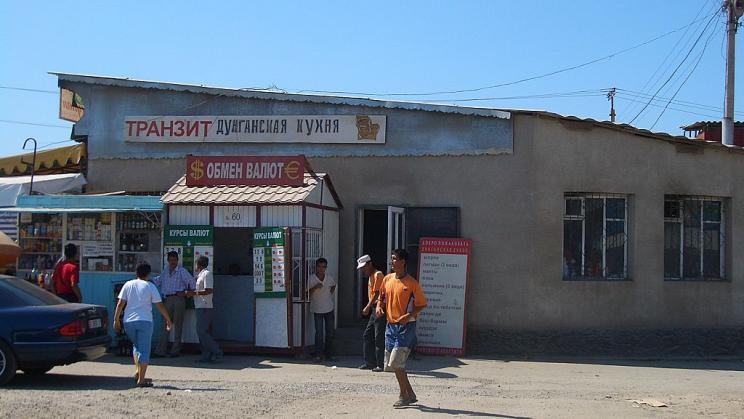
SIPRI is pleased to announce the third annual Life in Kyrgyzstan Conference to take place in Bishkek on 12–13 October 2017.
The conference is organized by the Institute of Public Policy and Administration of the University of Central Asia (UCA), Stockholm International Peace Research Institute (SIPRI), Leibniz Institute of Vegetable and Ornamental Crops (IGZ), International Food Policy Research Institute (IFPRI), International Security and Development Center (ISDC), and the Food and Agriculture Organization of the United Nations (FAO).
The two-day conference will bring together national and international experts from government and the public sector, development agencies, non-governmental organizations, academia and research institutions, and media to exchange knowledge and experiences on recent socio-economic developments in Kyrgyzstan and Central Asia, and to promote evidence-based policy making.
The conference will also inform on the process of the Life in Kyrgyzstan Study carried out in 2016 by an international consortium of research institutions with funding from IFPRI, IGZ, FAO and UCA.
To contribute to the discussion, we invite the submission of proposals for entire sessions or for individual research papers studying various aspects of socio-economic development in Kyrgyzstan or Central Asia. We welcome empirical papers using panel micro data, especially the Life in Kyrgyzstan Study data, which is accessible online.
We also encourage researchers to present other micro- and macroeconomic studies with relevant topics of research. We encourage PhD students and postdoctoral researchers to apply to participate in the conference and use this opportunity to receive feedback from senior researchers.
Research topics of individual submissions or entire sessions may include, but are not limited to:
- Poverty and inequality;
- Employment and labour markets;
- Migration and remittances;
- Entrepreneurship and informality;
- Gender, children and intra-household decision making;
- Education and health outcomes;
- Nutrition and food security;
- Rural livelihoods and agricultural market access;
- Home gardens and rural coping strategies;
- Value chains and export orientation;
- Public service delivery and decentralization;
- Impacts of trade and integration reforms;
- Social capital and social cohesion;
- Peacebuilding, trust and expectations;
- Micro-level data quality, survey methodology and panel data collection;
- Methods of rigorous impact evaluation;
- Sustainable development goals; and
- Climate change and its impact.
The organizers are seeking both individual papers and proposals for sessions of three or four papers, with preference given to complete session proposals.
Those interested in submitting sessions or papers to the conference are welcome to submit their applications by 15 June 2017 to likconference2017@gmail.com. Please include a session title, a session chair, a session organizer, the title and all co-authors for each paper; and a 200-word session summary. Individual papers may also be submitted either in a 200-word extended abstract form or as full papers. All submissions should be in English.
The conference language will be English, with simultaneous translation provided in Russian. Shortlisted applicants will be notified before 15 July 2017.
Academic committee: Dr Kamiljon Akramov (IFPRI), Professor Kathryn Anderson (Vanderbilt University), Professor Tilman Brück (IGZ/ISDC), Dr Damir Esenaliev (SIPRI), Dr Ada Ignaciuk (FAO), Dr Roman Mogilevskii (UCA) and Dr Kanat Tilekeyev (UCA).
There is no conference fee. Please note that travel and accommodation funds cannot be provided. Registration for participation in the conference will close on 15 September 2017.
For further inquiries please contact at likconference2017@gmail.com.
Organizing Institutions
University of Central Asia’s Institute of Public Policy and Administration (IPPA) was established in 2011 to strengthen public policy in Central Asia. It provides in-depth analysis on current and emerging policy issues facing the region, and improves the analytical capacity of governments and civil society to use evidence in decision-making processes through professional development. The Institute has produced a series of peer-reviewed research papers on social and economic issues, public administration and public policy relating to Central Asia and Afghanistan.
Stockholm International Peace Research Institute (SIPRI) is an independent international institute dedicated to research into conflict, armaments, arms control and disarmament. Established in 1966, SIPRI provides data, analysis and recommendations, based on open sources, to policymakers, researchers, media and the interested public.
Leibniz Institute of Vegetable and Ornamental Crops (IGZ) carries out basic and applied research supporting the sustainable production of vegetable and ornamental plants and the rational use of natural resources. It contributes to the success of horticulture in Germany and other countries, understanding fundamentals of horticultural and plant science, sustainability in production and use of plants, healthy nutrition and wellbeing of the population. Its work is rated by acceptance and appreciation by professionals in practical horticulture and by the society, publications in high-ranking scientific journals and acquisition of competitive grants.
International Food Policy Research Institute (IFPRI) is an international agricultural research center founded in the early 1970s to improve the understanding of national agricultural and food policies to promote the adoption of innovations in agricultural technology. Additionally, IFPRI aims to shed more light on the role of agricultural and rural development in the broader development pathway of a country. The mission of IFPRI is to seek sustainable solutions for ending hunger and poverty through research.
International Security and Development Center (ISDC) is a Berlin-based, non-for-profit research center conducting research, providing policy advice and building capacity on international security and socio-economic development. We are unique in the global research scene for being dedicated to work exclusively on the security-development nexus.
Food and Agriculture Organization of the United Nations (FAO) is an agency of the United Nations founded in 1943 with headquarters in Rome, Italy. Achieving food security for all is at the heart of FAO's efforts – to make sure people have regular access to enough high-quality food to lead active, healthy lives. Our three main goals are: the eradication of hunger, food insecurity and malnutrition; the elimination of poverty and the driving forward of economic and social progress for all; and, the sustainable management and utilization of natural resources, including land, water, air, climate and genetic resources for the benefit of present and future generations.